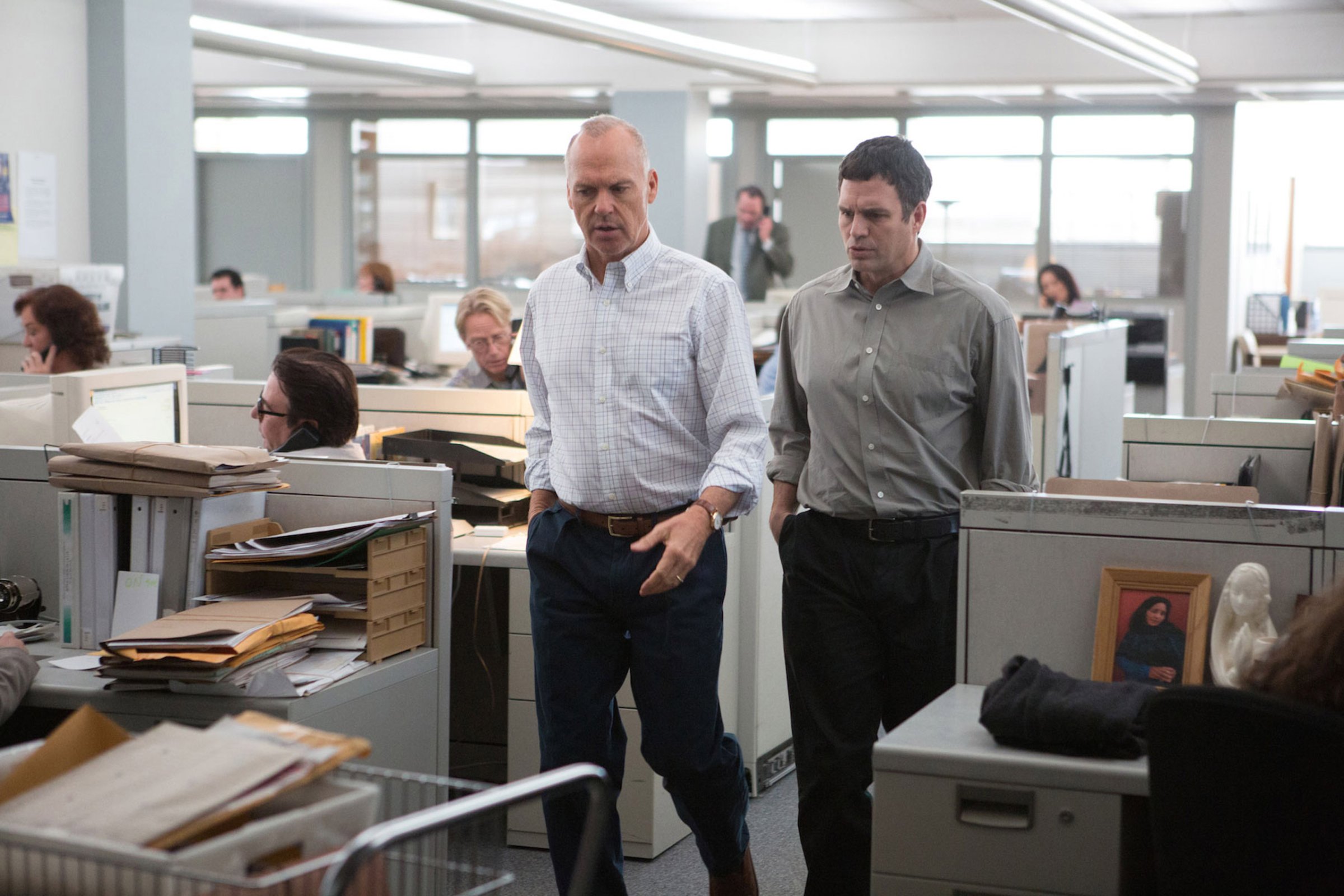
There’s a confessional booth’s worth of bad news in Spotlight, Tom McCarthy’s cauterizing drama about the Boston Globe’s 2002 exposé on priestly pedophilia. The good news, for McCarthy and his viewer, is that it all played out in Boston—the “Athens of America,” but also a city that provides implausible deniability: Everyone in power knew what everybody did. And what other people did about it. And whether someone did anything at all.
For all the dogged journalism and righteous indignation in the film, it’s this sense of intimacy, of community, of betrayal and misdirected allegiances—it was the Church, after all—that keeps the film from reveling too much in victory or triumph. That, in turn, makes it an emotional tour de force. “It might take a village to raise a child,” grumbles lawyer Mitchell Garabedian (Stanley Tucci), who is handling 80-odd abuse cases. “But it also takes a village to abuse one.” No one is innocent who doesn’t act. Not even the avenging angels of the press.
McCarthy’s best films (Win Win, The Visitor) have been about minor acts of heroism committed by ordinary people in unremarkable places. The reporters whom he puts center stage in Spotlight—Sacha Pfeiffer (Rachel McAdams), Mike Rezendes (Mark Ruffalo), Walter “Robby” Robinson (Michael Keaton) and Matty Carroll (Brian d’Arcy James)—fit his M.O. They are scribblers, part of the vanishing breed of full-time investigative reporters, going up against a monolithic and recalcitrant institution with the lion’s share of public support. Largely, they are just doing their jobs, albeit with progressively increasing vigor. McCarthy fills the film with process, with shoe-leathery reporting, showing how fragments of information rise and converge, create minor leads that become explosive revelations and which ultimately metastasize into a story of global import of how the Church, for decades, shuffled its repeat offenders from school to school and parish to parish.
This is not news—the paper won a Pulitzer for its stories. The Church has experienced a decade and a half of scandal. And yet, in the movie, it’s electrifying.
McCarthy allows the facts as they are uncovered to pretty much speak for themselves. There are very few moments of highly dramatic confrontation, unless it’s between some long-unheeded victims and the ink-stained wretches who have stumbled into a story that’s been festering for years. The ironic juxtaposition in the story, scripted by McCarthy and Josh Singer, is that of the media and the church, the fourth estate vs. the first, the opinion-poll pariah vs. the presumed path to godliness. There’s a constant tension between belief and faith and facts in Spotlight, whose reporters are all lapsed Catholics—this is Boston, after all—but, like many of the abuse victims, have their vision befogged, both by the unspeakable nature of the acts and the identity of the perpetrators. “Did you ever talk to anyone?” Sacha asks a gay victim named Joe (a terrific, brief turn by Michael Cyril Creighton). “Like who?” Joe asks. “A priest?”
The cast of Spotlight is a real ensemble; almost everyone underplays nobly, an exception being Ruffalo, who wears his hair in the modified Moe Howard-style of the real Mike Rezendes and may be trying to emulate Rezendes’ facial expressions. Whatever he’s doing, it’s a distraction. In contrast, a couple of the more marginal characters are given brilliantly understand portrayals, notably Tucci, whose Garabedian is a curmudgeon extraordinaire, and Liev Schreiber, whose Marty Baron is really the soul of the movie. His arrival at the beginning of the film, as the Globe’s new editor, is accompanied by the usual tremor of fear: Will he cut costs? Will he cut staff? Will he decertify the specialized Spotlight team, which, as its leader Robinson cautiously admits, can take a year to pursue a story? “We’ll see,” Baron says. And you think that’s it—heads on the chopping block.
But it’s Baron who decides to sue the church for documents connected to one of its abuse cases and it’s Baron who knows what the real story is about: Not a victim here or there, or even a dozen degenerate priests, but the system that allows them to remain at large, and trusted.
Baron is one of the “meddling outsiders” without whom, it is noted in the script, change is often never affected. Garabedian is another. One is a Jew, one is Armenian; they’ve sworn no blood oath to the Church, or its potentate and chief conspirator, Bernard Cardinal Law (an appropriately unctuous Len Cariou) who, it should be noted, remains in Rome—where he is comfortably retired, and even served as a pall bearer at the funeral of John Paul II. Knowing this probably won’t make viewers any angrier than they already are while watching Spotlight, because it’s less a cry of outrage than a lament—for trust betrayed, of course, but also for a brand of outraged, pre-internet journalism that could regularly bring malefactors to justice.
Correction: The original version of this story incorrectly identified the character played by Liev Schreiber. His name is Marty Baron.
More Must-Reads From TIME
- The 100 Most Influential People of 2024
- The Revolution of Yulia Navalnaya
- 6 Compliments That Land Every Time
- Stop Looking for Your Forever Home
- If You're Dating Right Now , You're Brave: Column
- The AI That Could Heal a Divided Internet
- Fallout Is a Brilliant Model for the Future of Video Game Adaptations
- Want Weekly Recs on What to Watch, Read, and More? Sign Up for Worth Your Time
Contact us at letters@time.com